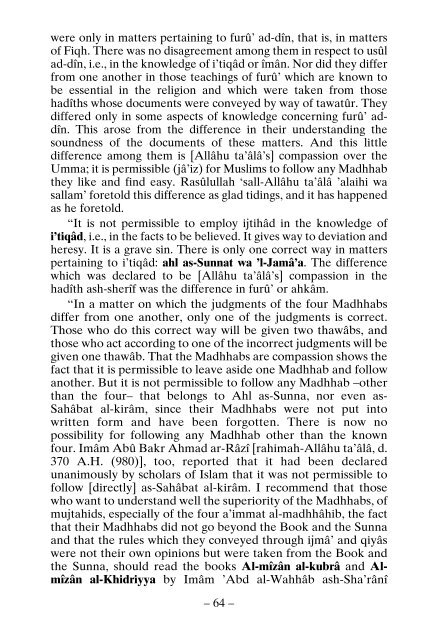Belief and Islam
BELIEF AND ISLAM star This work, Belief and Islam, originally was written in Persian under the title I’tiqâd-nâma by Hadrât Mawlânâ Khâlid al-Baghdâdî, a profound ‘âlim of Islam and a specialist in ma’ârif of tasawwuf. Hâji Faydullah Effendi of Kemah, a khalîfa of great walî Mavlânâ Mahmûd Sâhib, the brother of the author, translated the book into Turkish and named it Farâid-ul-fawâid which was printed in Istanbul in 1312 A.H.[1894]. Our bookstore had it translated again from the Persian original into Turkish and, some explanations and three chapters, published it with the title Imân ve Islâm in 1966. German, French and Arabic versions are also published by our bookstore. This book, explains five fundamentals of Islam, six fundamentals of îmân and the contemporary information about the matter and refutes those who are against Islam and those who are lâ-madbhabî.
BELIEF AND ISLAM
star This work, Belief and Islam, originally was written in Persian under the title I’tiqâd-nâma by Hadrât Mawlânâ Khâlid al-Baghdâdî, a profound ‘âlim of Islam and a specialist in ma’ârif of tasawwuf. Hâji Faydullah Effendi of Kemah, a khalîfa of great walî Mavlânâ Mahmûd Sâhib, the brother of the author, translated the book into Turkish and named it Farâid-ul-fawâid which was printed in Istanbul in 1312 A.H.[1894]. Our bookstore had it translated again from the Persian original into Turkish and, some explanations and three chapters, published it with the title Imân ve Islâm in 1966. German, French and Arabic versions are also published by our bookstore. This book, explains five fundamentals of Islam, six fundamentals of îmân and the contemporary information about the matter and refutes those who are against Islam and those who are lâ-madbhabî.
You also want an ePaper? Increase the reach of your titles
YUMPU automatically turns print PDFs into web optimized ePapers that Google loves.
were only in matters pertaining to furû’ ad-dîn, that is, in matters<br />
of Fiqh. There was no disagreement among them in respect to usûl<br />
ad-dîn, i.e., in the knowledge of i’tiqâd or îmân. Nor did they differ<br />
from one another in those teachings of furû’ which are known to<br />
be essential in the religion <strong>and</strong> which were taken from those<br />
hadîths whose documents were conveyed by way of tawatûr. They<br />
differed only in some aspects of knowledge concerning furû’ addîn.<br />
This arose from the difference in their underst<strong>and</strong>ing the<br />
soundness of the documents of these matters. And this little<br />
difference among them is [Allâhu ta’âlâ’s] compassion over the<br />
Umma; it is permissible (jâ’iz) for Muslims to follow any Madhhab<br />
they like <strong>and</strong> find easy. Rasûlullah ‘sall-Allâhu ta’âlâ ’alaihi wa<br />
sallam’ foretold this difference as glad tidings, <strong>and</strong> it has happened<br />
as he foretold.<br />
“It is not permissible to employ ijtihâd in the knowledge of<br />
i’tiqâd, i.e., in the facts to be believed. It gives way to deviation <strong>and</strong><br />
heresy. It is a grave sin. There is only one correct way in matters<br />
pertaining to i’tiqâd: ahl as-Sunnat wa ’l-Jamâ’a. The difference<br />
which was declared to be [Allâhu ta’âlâ’s] compassion in the<br />
hadîth ash-sherîf was the difference in furû’ or ahkâm.<br />
“In a matter on which the judgments of the four Madhhabs<br />
differ from one another, only one of the judgments is correct.<br />
Those who do this correct way will be given two thawâbs, <strong>and</strong><br />
those who act according to one of the incorrect judgments will be<br />
given one thawâb. That the Madhhabs are compassion shows the<br />
fact that it is permissible to leave aside one Madhhab <strong>and</strong> follow<br />
another. But it is not permissible to follow any Madhhab –other<br />
than the four– that belongs to Ahl as-Sunna, nor even as-<br />
Sahâbat al-kirâm, since their Madhhabs were not put into<br />
written form <strong>and</strong> have been forgotten. There is now no<br />
possibility for following any Madhhab other than the known<br />
four. Imâm Abû Bakr Ahmad ar-Râzî [rahimah-Allâhu ta’âlâ, d.<br />
370 A.H. (980)], too, reported that it had been declared<br />
unanimously by scholars of <strong>Islam</strong> that it was not permissible to<br />
follow [directly] as-Sahâbat al-kirâm. I recommend that those<br />
who want to underst<strong>and</strong> well the superiority of the Madhhabs, of<br />
mujtahids, especially of the four a’immat al-madhhâhib, the fact<br />
that their Madhhabs did not go beyond the Book <strong>and</strong> the Sunna<br />
<strong>and</strong> that the rules which they conveyed through ijmâ’ <strong>and</strong> qiyâs<br />
were not their own opinions but were taken from the Book <strong>and</strong><br />
the Sunna, should read the books Al-mîzân al-kubrâ <strong>and</strong> Almîzân<br />
al-Khidriyya by Imâm ’Abd al-Wahhâb ash-Sha’rânî<br />
– 64 –

















